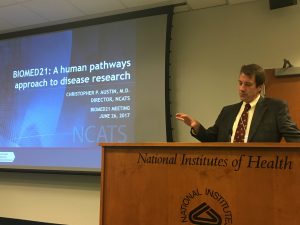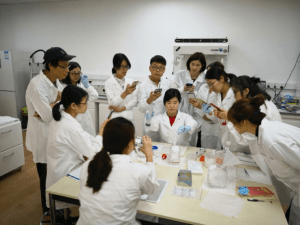31 July 2018
 Recommendations to come out of a workshop attended by representatives of the U.S. National Institutes of Health, the Federal Drug Administration, big pharma, and academia hold a dire warning: unless we invest more funding in human- rather than animal-based medical research to better predict which new drugs will treat human disease, the development of new drugs could dry up completely in the next 50 years. The paper, Recommendations toward a human pathway-based approach to disease research, published in the journal Drug Discovery Today summarizes the results of a two-day workshop that took place at the National Institutes of Health in June 2017.
Recommendations to come out of a workshop attended by representatives of the U.S. National Institutes of Health, the Federal Drug Administration, big pharma, and academia hold a dire warning: unless we invest more funding in human- rather than animal-based medical research to better predict which new drugs will treat human disease, the development of new drugs could dry up completely in the next 50 years. The paper, Recommendations toward a human pathway-based approach to disease research, published in the journal Drug Discovery Today summarizes the results of a two-day workshop that took place at the National Institutes of Health in June 2017.
The BioMed21 workshop, co-organized by the National Institutes of Health, The Humane Society of the United States, and Humane Society International, presented a comprehensive overview of existing efforts to prioritize human-based biology for health research and proposed key recommendations to revitalize the drug discovery process. [Read more…]
 The world’s most industrialized economies have been increasingly investing in technologies and opportunities that will eventually replace animal-models used in toxicology and biomedical research. In South America, too, a number of scientists have already recognized this trend and are interested in doing research that do not rely on animal models. Now, the BioMed21 Collaboration, a group of scientists and other stakeholders who together work towards replacing the use of animals in research, has published a paper in the journal Drug Discovery Today entitled
The world’s most industrialized economies have been increasingly investing in technologies and opportunities that will eventually replace animal-models used in toxicology and biomedical research. In South America, too, a number of scientists have already recognized this trend and are interested in doing research that do not rely on animal models. Now, the BioMed21 Collaboration, a group of scientists and other stakeholders who together work towards replacing the use of animals in research, has published a paper in the journal Drug Discovery Today entitled  Humane Society International, co-founder of the BioMed21 Collaboration, teamed up with global fashion brand H&M and together they financially supported China’s 8th Workshop on Alternative Methods, held June 11-13 in Shanghai. The event provided more than 200 scientists from industry, government bodies and academia with in-depth theoretical and hands-on experience in contemporary “new approach methods” (NAM) applicable to regulatory and research environments.
Humane Society International, co-founder of the BioMed21 Collaboration, teamed up with global fashion brand H&M and together they financially supported China’s 8th Workshop on Alternative Methods, held June 11-13 in Shanghai. The event provided more than 200 scientists from industry, government bodies and academia with in-depth theoretical and hands-on experience in contemporary “new approach methods” (NAM) applicable to regulatory and research environments.
 The number of scientists using sophisticated human cell-based methods to study tuberculosis (TB) is increasing, improving understanding of this deadly disease and potentially reducing the number of animals used in TB research. That is the major finding of a
The number of scientists using sophisticated human cell-based methods to study tuberculosis (TB) is increasing, improving understanding of this deadly disease and potentially reducing the number of animals used in TB research. That is the major finding of a 